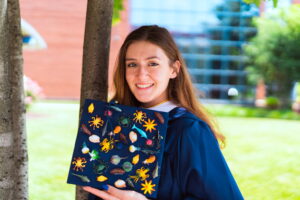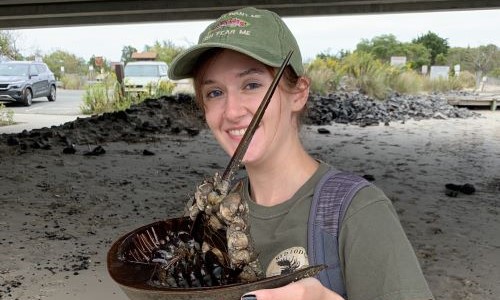
DANBURY, Connecticut — Danbury resident Katie Cunningham always hoped she’d end up doing something related to science one day. A 2017 Danbury High School graduate, Cunningham said, “I remember always being interested in science, even going to ‘super science camp’ during summers as a kid. I grew up on Candlewood Lake, which definitely solidified my interest in nature. I also remember bringing bugs into the house in mason jars all the time, and really freaking out my mom. This actually hasn’t changed much — I have multiple tanks with aquatic snails at my parents’ house right now that they’re lovingly putting up with,” she added.
After graduating from high school, Cunningham spread her wings and enrolled at Drexel University in Philadelphia, Pennsylvania, where she graduated with a Bachelor of Arts in Environmental Studies & Sustainability.
At Drexel, Cunningham studied marine epibionts, which she describes as “kind of like parasites, but not really.” She elaborated: “I tend to put it this way because epibiosis is a symbiotic relationship, in which one organism uses another as a living habitat. It sounds a lot like predation, but the host animal isn’t harmed, or even significantly affected by this. Epibionts usually lack mobility on their own, and can benefit hugely from utilizing the resources — nutrients, movement, etc. — of a more ecologically fit animal. Ultimately, they latch onto a bigger, stronger creature and remain there for life, protected and well-fed.” Cunningham’s undergraduate senior capstone project was focused on epibionts, so she says she’s been “obsessing about this for quite a while.”
When searching for a graduate program, Cunningham wanted to go somewhere that would allow her to continue to study marine epibiosis. “I learned about marine epibionts while interning at the Academy of Natural Sciences as an undergraduate, but understood that it was a very niche and understudied field,” she said. “Most of the people I spoke to had no idea what epibiosis was.”
Cunningham said she applied to Western Connecticut State University because it was in her hometown and familiar to her — only to learn that Professor of Biology Dr. Theodora Pinou, the coordinator of WCSU’s Master of Science in Integrative Biological Diversity degree program, studies epibionts on sea turtles. “That coincidence solidified my interest in WestConn, and it ended up being the only program I applied to. I lived in Philly for five years during my undergraduate studies and I didn’t really see myself moving back to Danbury,” Cunningham said, “but I eventually started to miss it. I’m very happy to be back now!”
Part of WCSU’s Integrative Biological Diversity master’s program requires participation in a stewardship project. Cunningham’s project involved epibiont copepods — tiny crustaceans that were found to be living on sharks in the Bahamas. These copepods are housed in the Yale Peabody Museum, where she took inventory and added their collection and host species data to the museum’s online database. “I spent a lot of time in the museum’s Invertebrate Zoology lab, cataloguing an assortment of epibiotic copepods,” she explained.
In addition to her coursework and stewardship project, Cunningham also worked as a teaching assistant and substitute teacher. “I became concerned that my recent work experience wasn’t setting me up for the scientific career I desired, so I began to apply for lab-oriented jobs around Connecticut to get back on track with research work,” she said. “Ultimately, I secured an interview with a contracting company working for Unilever in Trumbull, and was offered a position right before Christmas.”
Cunningham now works full-time in the Dove formulation lab at Unilever. “I’m mostly testing bodywash formulas that are in development on a small scale before these products reach the factory level. It’s quite a leap from the epibiont research I had been focused on, but I’m really enjoying it. Plus, there’s a huge benefit: this makes me smell amazing by the time I leave work every day,” she added.
Cunningham will complete her master’s degree in May and will reevaluate her career options then. “For years I’ve wanted to pursue field work, specifically in the marine sciences,” she said. “However, I feel like I’d be happy with any hands-on scientific area that allows me to see the product of my work. I certainly like what I’m doing now for that very reason. I’d still love to revisit epibionts at some point if the opportunity arose.” For now, though, Cunningham can enjoy the sweet smell of success in her Unilever lab.
For more information, visit www.wcsu.edu/biology-msbiodiversity/ or contact WCSU Communications and Marketing at pr@wcsu.edu.
Western Connecticut State University changes lives by providing all students with a high-quality education that fosters their growth as individuals, scholars, professionals and leaders in a global society. Our vision: To be widely recognized as a premier public university with outstanding teachers and scholars who prepare students to contribute to the world in a meaningful way.

